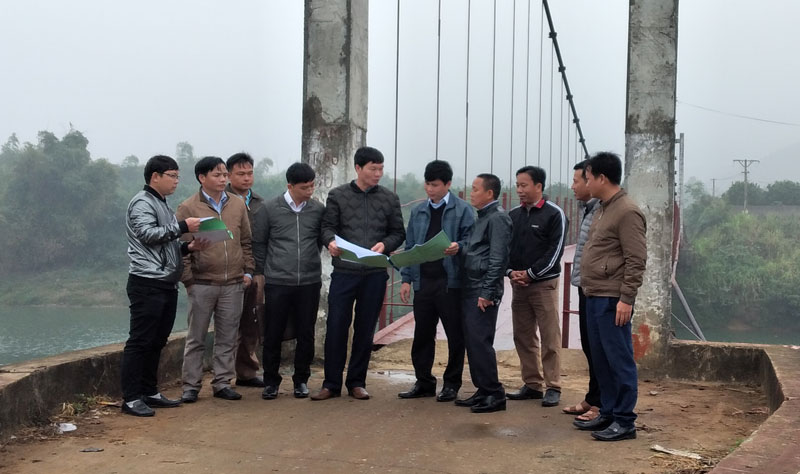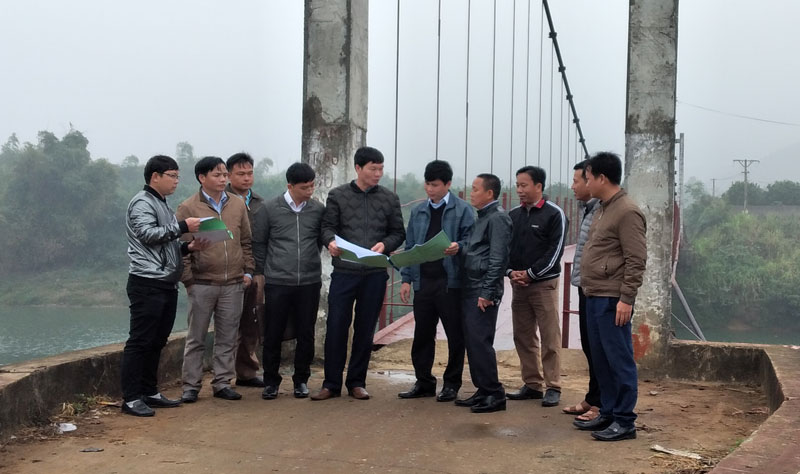
(HBO) – New bridges replacing old ones have cast a new look while contributing greatly to the socio-economic development in the land of Muong Bi, Muong Vang, Muong Thang and Muong Dong.
 The
suspension bridge connecting My and Ba Giang hamlets in Kim Boi district’s My
Hoa commune has been upgraded and repaired, creating a new driver for the local
socio-economic development.
The
suspension bridge connecting My and Ba Giang hamlets in Kim Boi district’s My
Hoa commune has been upgraded and repaired, creating a new driver for the local
socio-economic development.
As
a mountainous province with complicated terrain, local transport infrastructure
was under intense pressure, which means the locality needs big investment in
transport. Localities across the province have overcome challenges to mobilise
capital to comprehensively develop transport facilities with a view to
facilitating socio-economic development activities. And bridges serving
residential areas were seen as a top priority in allocating investment as they serve
transport, trade and socio-economic development in areas with rivers and streams.
According to Vice Director of the provincial Department of Transport Vu Ngoc
Son, construction of bridges aims to ensure smooth transport flow among
regions, thus driving forward socio-economic development.
Despite difficulties, the province has prioritised resources to branch out
network of bridges, especially in remote areas and those with special difficult
socio-economic conditions and inhabited by ethnic minority groups.
Many bridges have been built to benefit localities suffering severe
difficulties through a wide range of integrated programmes and projects, such
as LRAMP project that invested 110 billion USD in 42 bridges and culverts,
Project No.186 constructing 7 suspension bridges, the second phase of the
moutainous urban area programme setting aside 435 billion VND for Hoa Binh 3
bridge, and the provincial budget investing over 590 billion VND on Hoa Binh 2
bridge spanning Da River in Hoa Binh city.
Statistics from the Department of Transport showed that the province has 347
bridges, including 65 suspension bridges./.
The emulation movement "Hoa Binh joining hands to build new-style rural areas” has been widely spreading, becoming a driving force that motivates the localities to renew rural landscapes and improve the material and spiritual lives of the residents. In this movement, the people play a central role-both as the main implementers and direct beneficiaries of its outcomes.
In response to the global digital revolution, Hoa Binh Newspaper is transforming itself into a modern and multi-platform media hub, blending cutting-edge technology with a restructured newsroom and a new generation of tech-savvy journalists.
Hoa Binh province’s Association of the Elderly recently held a conference to review the project on expanding the inter-generation self-help club model until 2025.
In a move to implement Resolution No. 57-NQ/TW, issued on December 22, 2024 by the Politburo, which targets breakthroughs in science-technology development, innovation, and digital transformation, the Hoa Binh provincial Department of Health has issued a plan to roll out the "Digital Literacy for All” campaign within the local health sector.
An Nghia Commune (Lạc Sơn District) is one of the communes that achieved the tha standard of the national new rural area in 2018. Entering a new development phase, the commune is now trying to meet the criteria for the advanced new rural development. With the strong political will and the public consensus, the commune is gradually overcoming the challenges to reach this goal, aiming for the sustainable development.



 The
suspension bridge connecting My and Ba Giang hamlets in Kim Boi district’s My
Hoa commune has been upgraded and repaired, creating a new driver for the local
socio-economic development.
The
suspension bridge connecting My and Ba Giang hamlets in Kim Boi district’s My
Hoa commune has been upgraded and repaired, creating a new driver for the local
socio-economic development.